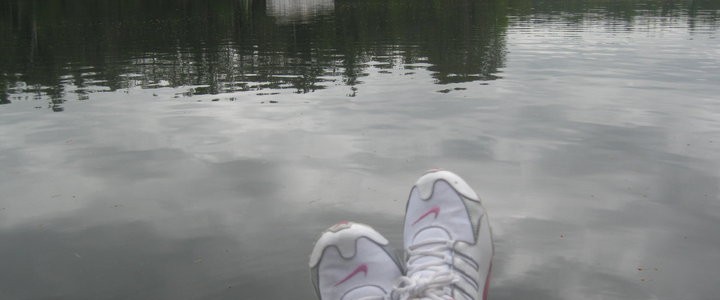Yesterday I spent almost the entire day reading.
I was reading a 700 plus page library book that was due that very day, and I was still 400 pages away from the end. I decided to shut out the noise of the world, close my laptop, shut the blinds, turn on the soft light from my favorite lamp, and cozy up on the couch to finish the book in time to save the $0.25 late fee (plus, 30 other people were on a waiting list to check out the book, so I didn’t want to keep them waiting).
Relaxing as that sounds, sadly, I was stressed out the entire time.
Granted, the book itself was very stressful (it’s called The Goldfinch by Donna Tartt, and, to be succinct without giving anything away, let’s just say that the main character had a tough life). But I was stressed for a different reason:
With every turn of the page, a voice would inevitably chime its obnoxious and very opinionated suggestion:
Shouldn’t you be checking your e-mail? Shouldn’t you be doing something else?
Because I wasn’t checking my e-mails, I felt like I was missing something important. I felt like a bad employee playing hooky, even though I mostly work for myself.
It was such a terrible feeling! And I knew it was silly, but I still couldn’t help the guilt that kept creeping its way into every part of my body, including my very nervous and mostly knotted stomach.
When did this happen? When did my digital world take such a strong hold on my life?
I remember the day when my dad brought our first computer home. It was a desktop. Huge. Light grey. I don’t remember the brand, though I know it wasn’t a Mac. You needed to plug into the phone jack in order to hook up to the internet. But before you plugged in, you had to make sure no one was expecting a call or needed to use the phone, because your land line was the only point of contact in those days. Cell phones were around, but they barely existed the way they do now. In fact, it would take another 10 years before I myself finally broke down and got one.
Anyway, once the wire was in the phone jacket, you would click on the internet symbol and hear the now not-so-familiar sounds of the internet dialing into space, making its funny beeping and scratching noises as it tried to connect. Five minutes later, you were on the internet. The glorious internet! I don’t even remember what you could look up online at that time, nor if Google even existed. I think everyone had a Microsoft outlook e-mail account, so you would check that. But you were lucky to get an e-mail a week, much less one a day.
But today, things are obviously different. Entire studies are being done on how distracted we are. Car crashes are caused every day by texting or talking on the phone and driving. Everywhere you go – restaurants, shopping malls, and even driving down the road – more and more people are looking down at their phones instead of talking to the people right in front of them. Coffee shops seem to have just as many laptops as they do people (guilty). And on more occasions than I care to admit, I personally can’t even get into a long grocery store line without feeling the urge to pull out my phone to “fill” the time with a peek at my e-mails or a few posts on Pinterest (gosh that pumpkin pie looks good!).
And therein lies the problem. In this age of digital overload, we are not allowing those precious spaces between the noise to exist. We are not honoring the silences that our souls so desperately need, that reconnection to ourselves that is lost in the noise of our pinging phones and hi-speed internet.
Even now, my daily planner is sitting next to me, its to-do list taunting me, daring me to try to fit everything I’ve written on it into my day. My e-mail is open. I’m fighting the urge to open Facebook and gosh darn it, I really should do another Twitter post about that website I just started writing for. And oh, I have to text the girls back, and I should really get in the kitchen and bake some more granola for the studio. And dinner! What to make? I should do groceries. And I have to pack for my trip. But my phone keeps pinging and the e-mails keep coming in. What to do first?
It’s never ending. My mind races constantly. There’s no room for silence in this noisy head of mine, and I know, deep down, that silence is exactly what I need. Oh – another e-mail just came in. Should I check it?
No.
But I really want to.
Being so connected makes me feel frazzled – and distressingly disconnected. From myself. I feel like there is an expectation to answer texts right away, to answer e-mails immediately, or else. Or else…what? Or else…scrutiny. People will think I’m not on my game, not dependable, not serious about my work, not….not…a trustworthy person? I don’t know.
(You should know that I just broke down and checked my texts. Couldn’t help it – the phone was a buzz and the thread was long. I suck.)
Fittingly, I was driving home from work the other night when an author named Micheal Harris was speaking on the Diane Rehm show on NPR. He wrote a book called The End of Absence: Reclaiming What We’ve Lost in a World of Constant Connection. In it, he was talking about the importance of letting there be silences in our lives. He also said that anyone born after 1985 would never know what it was like to live in a world without the internet. As such, he said that those of us born before 1985 have a unique opportunity to draw on our memories of a quieter world, a quieter time, and an era where there was more (and arguably only) space for personal rather than digital connection.
Gone are the days when we used to just sit and wait for the bus at the bus stop, daydreaming, or maybe reading a book or listening to our discman (remember those?). Gone are the car and plane rides where you would just have to sit and stare out the window, alone with your thoughts, thinking about…well…anything! rather than looking down at a screen.
And, to quote the synopsis from Amazon.com, the thesis of Mr. Harris’ book is really this:
That the rarest commodity today is the chance to be alone with our own thoughts.
There was a recent article about a man in Seattle who, with 37 000 followers on Facebook and Twitter, would post at least 30 times a day. When he started thinking in 140 character tweets, he decided to give himself a 365 day digital detox. No internet. No phone. No texts. No tweets. Nothing but good ol’ personal, face to face connection. He gave his spaces the chance to exist. He ended up 25 pounds lighter and a lot happier, but he came back with a nagging worry:
Now that he was back on the internet, would he just fall into the same trap as he was in before?
Well, honestly, he just might. Because the biggest problem in trying to disconnect is that the world doesn’t work the way it did before 1985. The world expects you to be connected. All the time. So how can you disconnect when the world around you isn’t following suit?
Therein lies another problem. One that I don’t know the answer to.
But I know this:
There has to be a connection between the increased level of over stressed, over medicated, over caffeinated people in the world, and the increase in digital connection. If you want to be digitally connected, fine, I get it. I’m right there with you. But at least give yourself some time alone with your thoughts each day to breathe, take it all in, and just be. Because if we don’t fight for it now, soon, as it seems to be the case for those born after the mid 80’s, it will be extinct.
You don’t have to go all out – baby steps are good. Take what little moments you have during the day when you can to bask in the glory of silence.
Here are 7 ideas to try today:
1. Stop taking your phone with you into the bathroom when you go #2.
Don’t lie. You know you do it. 75% of Americans have admitted to it. Just think of all those poop particles on everyone’s phones! Because you can bet not very many (if any) people are sanitizing those phones after they get up from their porcelain thrown. Just a thought…
2. Don’t take out your phone while waiting in line at the grocery store.
3. Resist the urge to pull out your phone while you’re waiting for your friends at a restaurant.
Why not bring a book and read instead? Or bring a journal and write? Or do nothing? Just people watch. It’s fun!
4. Define your boundaries with your e-mail and texting contacts.
Decide to only respond to e-mails and texts between certain hours of the day and honor those times. Train people how to communicate with you.
5. Pick a time each day when you will turn off all digital connection.
6. Go for a walk – even if it’s only for 5 minutes – every day.
Don’t bring your phone with you. Maybe bring some tea instead. Or coffee. Or chocolate. Whatever makes you smile.
7. Don’t check your e-mails first thing in the morning.
Some of the most productive and successful people in the world all have given this advice. And, as I understand it, checking e-mails in the morning sets you on a path of reaction rather than productivity, allowing the day to control you rather than the other way around. So don’t do it. Work out. Read the paper. Meditate. But just don’t check your e-mails first thing in the morning.
Whatever you can do to get some more silence into your life, do it. Because it’s true what they say: silence is golden. And sometimes, the most powerful thing you can do or say is nothing at all.
Love, love, love,
Lauren
xxx
*Note: It is fitting that this post comes to you the day before I head to my cottage for 9 days to celebrate my father’s birthday. With the beauty that exists around the cottage, family and scenery included, you can bet that I will be embarking on a digital detox.
As such, for the first time in almost a year, there won’t be a post next week. In its place will be silence, room for the spaces between.
Looking forward to connecting with you again when I get back, October 8.








